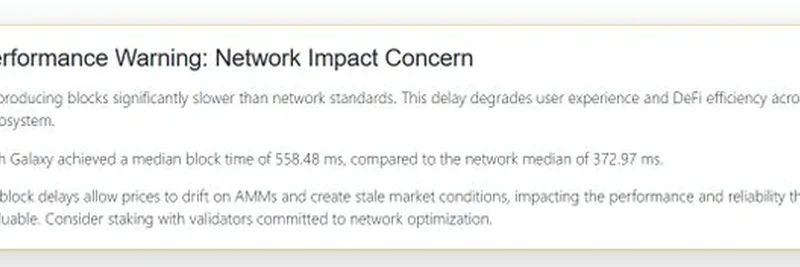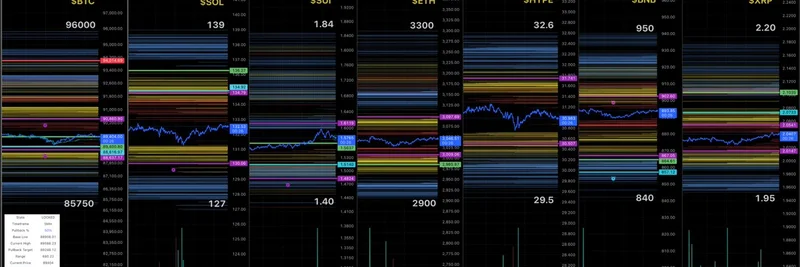Hey there, crypto enthusiasts! If you’ve been keeping an eye on the Solana blockchain, you might have noticed some buzz around a recent performance warning. The folks at Solana Compass dropped a bombshell about a validator called Galaxy, and it’s causing quite a stir in the ecosystem. Let’s break it down in simple terms and see what this means for you, whether you’re a staker, a DeFi user, or just a curious blockchain fan.
What’s Happening with Galaxy Validator?
The warning highlights that Galaxy, one of the validators on the Solana network, is producing blocks significantly slower than the network’s standards. For those new to this, validators are like the backbone of a blockchain—they process transactions and keep the network running smoothly. The ideal block time on Solana is around 400 milliseconds (ms), but Galaxy’s median block time last epoch clocked in at a sluggish 558.48 ms, compared to the network’s median of 372.97 ms. That’s a noticeable lag!
Why Does This Matter?
Slow block times might sound like a minor tech detail, but they have a real impact. When blocks take longer to process, it can lead to delays in your transactions landing. For DeFi (decentralized finance) users, this means prices on automated market makers (AMMs) might drift, creating stale market conditions. Imagine trying to trade a meme token like Dogecoin or Shiba Inu and getting outdated prices—frustrating, right? This slowdown affects the reliability and speed that make Solana a popular choice for fast transactions.
The Bigger Picture: Network Goals at Stake
Solana is all about accelerating performance and handling more transactions with higher compute limits. The network has been working hard to hit those 400 ms block time goals, and most nodes are now averaging 370 ms or less—pretty impressive! But when big validators like Galaxy deliberately slow down (possibly to snag high-value transactions), it throws a wrench in the works. This even extended the last epoch by about an hour, meaning extra waiting time for everyone every two days.
What’s Being Done?
Solana Compass isn’t letting this slide. They’ve introduced a penalty and a prominent warning for validators consistently taking over 420 ms to execute blocks. This threshold will likely drop as Solana pushes for even faster performance. Plus, these warnings might pop up next to validator brand names on Google searches—talk about public accountability! If you’re staking with Galaxy or similar nodes, the advice is clear: consider switching to validators committed to network optimization.
How to Stay Informed
Want to check the speed of your validators? Head over to Solana Compass to compare performance data. It’s a handy tool to ensure your staked SOL is working for a healthier network. The community, including users like jasper9, is cheering on these efforts, so you’re not alone in wanting a smoother Solana experience.
Final Thoughts
This Galaxy slowdown is a reminder of how interconnected blockchain networks are—and how validator behavior can ripple through the ecosystem. For meme token fans and blockchain practitioners alike, staying updated on these developments is key. At Meme Insider, we’re here to help you navigate the latest crypto news and tech trends. Keep an eye on your staking choices, and let’s work together to keep Solana blazing fast!
Got questions or want to dive deeper? Drop a comment below or check out more insights on our knowledge base. Happy staking!


